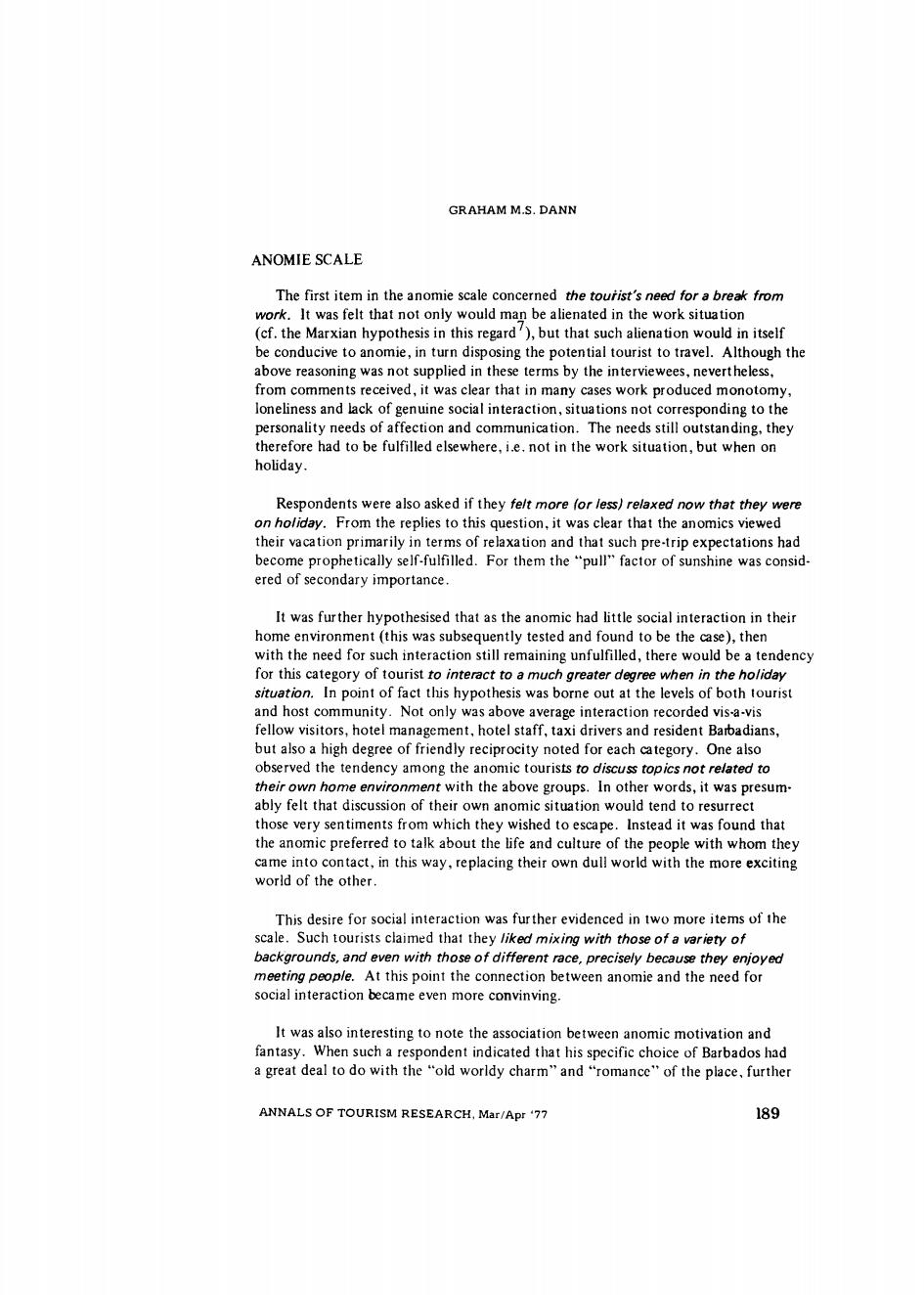正在加载图片...

GRAHAM M.S.DANN ANOMIE SCALE The first item in the anomie scale concerned the tourist's need for a break from work.It was felt that not only would man be alienated in the work situation (cf.the Marxian hypothesis in this regard),but that such alienation would in itself be conducive to anomie,in turn disposing the potential tourist to travel.Although the above reasoning was not supplied in these terms by the interviewees,nevertheless, from comments received,it was clear that in many cases work produced monotomy, loneliness and lack of genuine social interaction,situations not corresponding to the personality needs of affection and communication.The needs still outstanding,they therefore had to be fulfilled elsewhere,i.e.not in the work situation,but when on holiday. Respondents were also asked if they felt more for less)relaxed now that they were on holiday.From the replies to this question,it was clear that the anomics viewed their vacation primarily in terms of relaxation and that such pre-trip expectations had become prophetically self-fulfilled.For them the "pull"factor of sunshine was consid- ered of secondary importance. It was further hypothesised that as the anomic had little social interaction in their home environment(this was subsequently tested and found to be the case),then with the need for such interaction still remaining unfulfilled,there would be a tendency for this category of tourist to interact to a much greater degree when in the holiday situation.In point of fact this hypothesis was borne out at the levels of both tourist and host community.Not only was above average interaction recorded vis-a-vis fellow visitors,hotel management,hotel staff,taxi drivers and resident Barbadians, but also a high degree of friendly reciprocity noted for each category.One also observed the tendency among the anomic tourists to discuss topics not related to their own home environment with the above groups.In other words,it was presum- ably felt that discussion of their own anomic situation would tend to resurrect those very sentiments from which they wished to escape.Instead it was found that the anomic preferred to talk about the life and culture of the people with whom they came into contact,in this way,replacing their own dull world with the more exciting world of the other. This desire for social interaction was further evidenced in two more items of the scale.Such tourists claimed that they liked mixing with those of a variety of backgrounds,and even with those of different race,precisely because they enjoyed meeting people.At this point the connection between anomie and the need for social interaction became even more convinving. It was also interesting to note the association between anomic motivation and fantasy.When such a respondent indicated that his specific choice of Barbados had a great deal to do with the "old worldy charm"and "romance"of the place,further ANNALS OF TOURISM RESEARCH,Mar/Apr '77 189GRAHAM M.S. DANN ANOMIE SCALE The first item in the anomie scale concerned the touiist's need for a break from work. It was felt that not only would man be alienated in the work situation (cf. the Marxian hypothesis in this regard?), but that such alienation would in itself be conducive to anomie, in turn disposing the potential tourist to travel Although the above reasoning was not supplied in these terms by the interviewees, nevertheless, from comments received, it was clear that in many cases work produced monotomy, loneliness and lack of genuine social interaction, situations not corresponding to the personality needs of affection and communication. The needs still outstanding, they therefore had to be fulfilled elsewhere, i.e. not in the work situation, but when on holiday. Respondents were also asked if they felt more (or less) relaxed now that they were on holiday. From the replies to this question, it was clear that the anomics viewed their vacation primarily in terms of relaxation and that such pre-trip expectations had become prophetically self-fulfilled. For them tile "pull" factor of sunshine was considered of secondary importance. It was further hypothesised that as the anomic had little social interaction in their home environment (this was subsequently tested and found to be the case), then with the need for such interaction still remaining unfulfilled, there would be a tendency for this category of tourist to interact to a much greater degree when in the holiday situation. In point of fact this hypothesis was borne out at the levels of both tourist and host community. Not only was above average interaction recorded vis-a-vis fellow visitors, hotel management, hotel staff, taxi drivers and resident Badaadians, but also a high degree of friendly reciprocity noted for each category. One also observed the tendency among the anomic tourists to discuss topics not related to theirown home environment with the above groups. In other words, it was presumably felt that discussion of their own anomic situation would tend to resurrect those very sentiments from which they wished to escape. Instead it was found that the anomic preferred to talk about the life and culture of the people with whom they came into contact, in this way, replacing their own dull world with the more exciting world of the other. This desire for social interaction was further evidenced in two more items of the scale. Such tourists claimed that they liked m&ing with those of a ¢arieW of backgrounds, and even with those of different race, precisely because they enjoyed meeting people. At this point the connection between anomie and the need for social interaction became even more convinving. ]t was also interesting to note the association between anomic motivation and fantasy. When such a respondent indicated that his specific choice of Barbados had a great deal to do with the "old worldy charm" and "romance" of the place, further ANNALS OF TOURISM RESEARCH, Mar/Apr '77 189